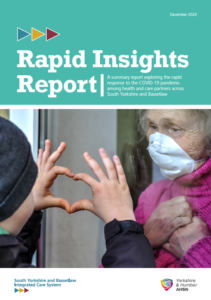Covid-19 learning: New Rapid Insights Report for South Yorkshire and Bassetlaw published this week
Posted: 8th December 2020
 A new research-led report details how health and care services across South Yorkshire and Bassetlaw were able to continue delivering non-essential patient care and services during the first wave of the COVID-19 pandemic – considered as one of the most challenging periods of the NHS’ history – through digital innovation, reconfiguring services and enhanced partnership collaboration.
A new research-led report details how health and care services across South Yorkshire and Bassetlaw were able to continue delivering non-essential patient care and services during the first wave of the COVID-19 pandemic – considered as one of the most challenging periods of the NHS’ history – through digital innovation, reconfiguring services and enhanced partnership collaboration.
As part of the NHS Evaluation and Reset work, this week sees the publication of a Rapid Insights Report developed in collaboration with South Yorkshire and Bassetlaw Integrated Care System.
It was less than one year-ago when South Yorkshire and Bassetlaw (SYBs) health and care partners were faced with the unprecedented threats and challenges presented by the first cases of COVID-19, at a time when Coronavirus illnesses were largely unknown.
By the time of the first national lockdown on 23 March, health and care services across the UK had to rapidly adapt and transform patient care, as services were asked to shift their focus on the treatment and care of COVID-19 patients.
As a result, the routine electives and outpatient care activity in hospitals had not gone away, and required health and care partners in SYB to deliver treatments and assessments in new, innovative ways using digital communications platforms, adapting wards and deploying staff to areas of greatest need.
The Report provides a timely snapshot of these service adaptions at a time when heightened infection control measures were in place across the SYB system.
Outcomes include a number of recommendations around the continued use of digital communication platforms, utilising seamless patient record systems and upholding the enhanced workforce mobility that has supported SYB during the pandemic so far.
Further areas of consideration are based on which of these transformation projects could be incorporated into future services, and identifies those that require more work, testing or consultation.
The Report includes case study examples from across Trusts and Clinical Commissioning Groups from SYB such as introducing digital technology into care homes for consultations, improved patient-record sharing across regional partners to support vulnerable patient care, and an effective triage system that helped signpost and reduce pressures on Accident and Emergency (A&E) wards.
Richard Stubbs, Chief Executive of the Yorkshire & Humber AHSN, commented: “It has been a difficult year and the pandemic continues to pose incredible challenges for everyone across our health and care system. But the crisis has also accelerated the adoption of innovations and service transformations at a pace and scale never seen before. It has brought organisations together across the whole region from the NHS and social care to local authorities, voluntary and third sector organisations.
We have been incredibly busy working with our colleagues across the region to evaluate the impact of such changes and help to identify those service improvements that will continue to deliver value in the future. And while technology and innovation have been key drivers in the transformation of services, these changes would have not been possible without a shift in culture and behaviours. The methodology developed for these rapid insights will be valuable in the future to help better understand what it is need to scale up and adopt innovations. It is a legacy that will remain even after the end of the pandemic”.
Lisa Kell, Director Transformation at South Yorkshire and Bassetlaw Integrated Care System (ICS), said: “Our collaboration with the Yorkshire & Humber AHSN on the rapid insights and evaluation programme has been fundamental in helping us to better understand the scale of changes made across our five places during the pandemic.
Being able to capture the views of SYBs wider workforce across the system during this period of rapid innovation and change has been absolutely crucial. This will support SYB’s health and care partners to consider how these adaptions can be taken forward in the future. Being able to share learning from our rapid insights research with the four North East and Yorkshire ICSs across this wider regional network has also been really valuable.
Our hope is that these reflections put us in a stronger position to take forward the SYB vision to support everyone in South Yorkshire and Bassetlaw to have the best possible start in life, with support to be healthy and live well, for longer.”
Alongside the case studies, the Report also includes interview summaries with senior leaders such as Chief Clinical Information Officers (points of liaison to support the strategic aims of organisations) and Programme Directors within the ICS (leadership and oversight for ICS programmes to run to a high standard).
The Report also provides individual cases study examples from within the health and care workforce, providing insights about the benefits of working remotely said to give greater work-life balance, reduced commute times and improvements in collaboration between SYBs partner organisations.
The Yorkshire & Humber AHSN and the South Yorkshire and Bassetlaw ICS are continuing to work together and aim to produce further reports in in the coming year, in order to ensure the learning from the COVID-19 response is shared, adopted and adapted where appropriate to continue to deliver quality health and care services that are safe for people across the region.
